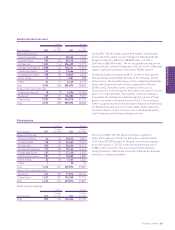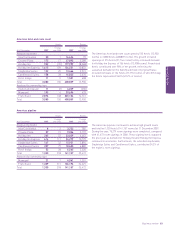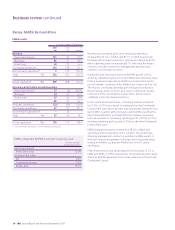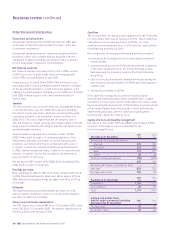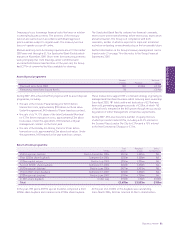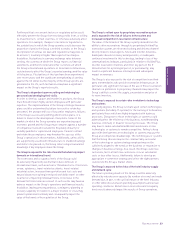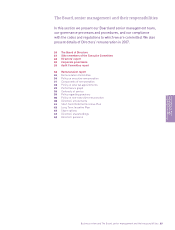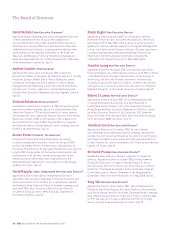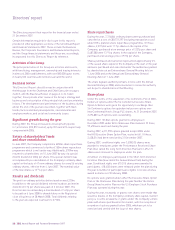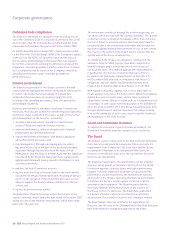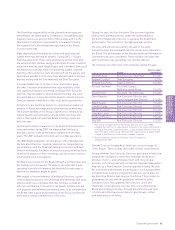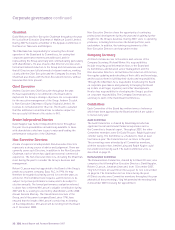Holiday Inn 2007 Annual Report Download - page 24
Download and view the complete annual report
Please find page 24 of the 2007 Holiday Inn annual report below. You can navigate through the pages in the report by either clicking on the pages listed below, or by using the keyword search tool below to find specific information within the annual report.22 IHG Annual Report and Financial Statements 2007
Business review continued
Risk management
The Group is subject to a variety of risks which could have a
negative impact on its performance and financial condition. The
Board is responsible for the Group’s system of internal control
and risk management, and for reviewing its effectiveness. In order
to discharge that responsibility, the Board has established an
ongoing process to identify significant business risks facing the
Group. The Board also receives assurance from the internal
audit and risk management functions that these risks are being
appropriately managed, having regard to the balance of risk,
cost and opportunity.
This section describes some of the risks that could materially
affect the Group’s business. The factors below should be considered
in connection with any financial and forward-looking information
in this Business Review and the cautionary statements contained
on page 101.
The risks below are not the only ones that the Group faces.
Some risks are not yet known to IHG and some that IHG does not
currently believe to be material could later turn out to be material.
All of these risks could materially affect the Group’s business,
revenue, operating profit, earnings, net assets and liquidity
and/or capital resources.
The Group is reliant on the reputation of its brands and the
protection of its intellectual property rights
Any event that materially damages the reputation of one or more
of the Group’s brands and/or failure to sustain the appeal of the
Group’s brands to its customers could have an adverse impact
on the value of that brand and subsequent revenues from that
brand or business. In addition, the value of the Group’s brands is
influenced by a number of other factors, some of which may be
outside the Group’s control, including commoditisation (whereby
price/quality becomes relatively more important than brand
identifications due, in part, to the increased prevalence of third-
party intermediaries), consumer preference and perception,
failure by the Group or its franchisees to ensure compliance
with the significant regulations applicable to hotel operations
(including fire and life safety requirements), or other factors
affecting consumers’ willingness to purchase goods and services,
including any factor which adversely affects the reputation of
those brands.
In particular, where the Group is unable to enforce adherence to
its operating and quality standards, or the significant regulations
applicable to hotel operations, pursuant to its management and
franchise contracts, there may be further adverse impact upon
brand reputation or customer perception and therefore the value
of the hotel brands.
Given the importance of brand recognition to the Group’s
business, the Group has invested considerable effort in protecting
its intellectual property, including registration of trademarks and
domain names. However, the laws of certain foreign countries in
which the Group operates do not protect the Group’s proprietary
rights to the same extent as the laws in the US and the European
Union. This is particularly relevant in China where, despite recent
improvements in intellectual property rights, the relative lack
of protection increases the risk that the Group will be unable
to prevent infringements of its intellectual property in this key
growth market. Any widespread infringement or misappropriation
could materially harm the value of the Group’s brands and its
ability to develop the business.
The Group is exposed to a variety of risks related to identifying,
securing and retaining management and franchise agreements
The Group’s growth strategy depends on its success in identifying,
securing and retaining management and franchise agreements.
Competition with other hotel companies may generally reduce
the number of suitable management, franchise and investment
opportunities offered to the Group and increase the bargaining
power of property owners seeking to engage a manager or
become a franchisee. The terms of new management or franchise
agreements may not be as favourable as current arrangements
and the Group may not be able to renew existing arrangements
on the same terms.
There can also be no assurance that the Group will be able to
identify, retain or add franchisees to the Group system or to
secure management contracts. For example, the availability
of suitable sites, planning and other local regulations or the
availability and affordability of finance may all restrict the supply
of suitable hotel development opportunities under franchise or
management agreements. There are also risks that significant
franchisees or groups of franchisees may have interests that
conflict, or are not aligned, with those of the Group including,
for example, the unwillingness of franchisees to support brand
improvement initiatives. In connection with entering into
management or franchise agreements, the Group may be
required to make investments in, or guarantee the obligations
of, third-parties or guarantee minimum income to third-parties.
Changes in legislation or regulatory changes may be
implemented that have the effect of favouring franchisees relative
to brand owners.
The Group is exposed to the risks of political and economic
developments
The Group is exposed to the risks of global and regional adverse
political, economic and financial market developments, including
recession, inflation and currency fluctuations that could lower
revenues and reduce income. A recession in one country or more
widely tends to reduce leisure and business travel to and from
affected countries and would adversely affect room rates and/or
occupancy levels and other income-generating activities resulting
in deterioration of results of operations and potentially reducing
the value of properties in affected economies. The owners or
potential owners of hotels managed or franchised by one group
face similar risks which could adversely affect IHG’s ability to
secure management or franchise agreements. More specifically,
the Group is highly exposed to the US market and, accordingly, is
particularly susceptible to adverse changes in the US economy.



